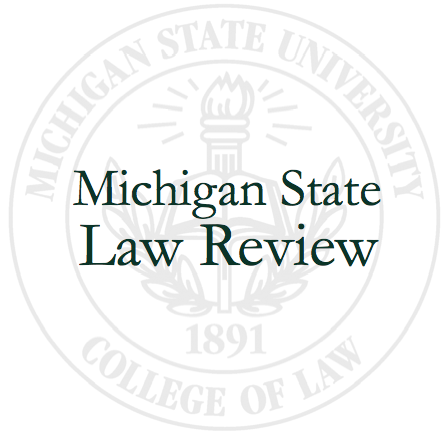Valid Taxing Power or Home Equity Theft?: The Constitutionality of the General Property Tax Act
McKenzie Stone, Managing Editor (‘21)
On July 17, 2020, the Supreme Court of Michigan rendered a decision in Rafaeili, L.L.C. v. Oakland County, which left certain provisions in the General Property Tax Act (GPTA) unconstitutional.[1] In 2011, plaintiff Rafaeli, LLC—a business owned by Uri Rafaeli—purchased real estate in Michigan but unintentionally failed to pay the full amount owed in property taxes.[2] Due to a miscalculation, Rafaeli owed $8.41 from his 2011 property taxes, unbeknownst to him.[3] He continued paying taxes on time until early in 2014 when Oakland County foreclosed on his property to satisfy his 2011 delinquency.[4] Oakland County sold Rafaeli’s property at public auction for $24,500, and kept the surplus proceeds from the sale per the long-standing law under the GPTA.[5]
Rafaeli’s case was consolidated with another similar case where appellant Ohanessian also unintentionally failed to pay his property taxes in 2011, owing approximately $6,000 in delinquent taxes.[6] Ohanessian’s story is also tragic because he moved to California and did not realize he was in tax delinquency until Oakland County had already foreclosed on his property.[7] Oakland County sold Ohanessian’s property at public auction for $82,000 and kept the surplus proceeds from the sale.[8]
The Michigan Supreme Court held that the practice of allowing counties to retain the surplus proceeds from a tax foreclosure sale amounts to an unconstitutional taking of property under the Michigan Takings Clause.[9] The Court further held that the GPTA is unconstitutional insofar as it allows counties to keep surplus proceeds without providing just compensation for the property owner.[10] Since this ruling, many other actions have been filed in Michigan to challenge the GPTA’s process, including former property owners from years past.[11] In fact, local governments—who often rely largely on tax funds to cover their general spending—may now take a devastating hit to their budget if they are forced to pay back former property owners who were denied the surplus proceeds to which they were entitled, according to the Michigan Supreme Court.[12]
The Pacific Legal Fund—a long-time advocate against injustices such as home equity theft—represented Rafaeli and Ohanessian in an attempt to protect the rights of property owners and ensure that local governments are not taking advantage of and effectively “stealing” from their property owners.[13] Predatory government procedures amounting to home equity theft exist not only in Michigan, but in twelve other states in the United States to a similar extent.[14]
The reasoning behind the Court’s decision in Rafaeli is due to the idea that a government body cannot impose an unreasonable tax upon its citizens, nor can it take private property to satisfy a debt without just compensation to the former property owner.[15] Under the statutory scheme for the GPTA, when a tax delinquency on real property occurs, the property is then forfeited and foreclosed on by the county in which it sits, the property owner is given a chance to redeem the foreclosed property, and absent a proper redemption, the property is sold at public auction to satisfy the debt.[16] In many cases, like Rafaeli’s and Ohanessian’s, the property is sold for more than the tax debt; however, the government would still keep the surplus proceeds from the sale and transfer them to a general fund—this portion of the GPTA is what establishes an unconstitutional taking of private property.[17]
To assert a takings claim, a plaintiff is required to show a “vested property right under state law.”[18] Not finding a vested interest in state law in the Rafaeli case, the Michigan Supreme Court looked instead to common law, diving deep into the archive by way of the Magna Carta, the Takings Clause of the Michigan Constitution, and other common law property rights to establish that a former property owner has a vested right in the surplus proceeds from a foreclosure sale.[19] Thus, the government’s broad taxing power is not sufficient to justify the taking of approximately $24,500 to satisfy an $8.41 delinquency.[20] While this case was a pivotal victory, it is far from the end. Michigan may have ended home equity theft in the future, but many people from the past decaderemainaggrieved.[21] Furthermore, this problem still persists to some extent in twelve other states.[22] Courts must strike down laws such as the Michigan statute that allowed local governments to keep surplus proceeds to promote fair practices and avoid disproportionate taxing powers.[23] Legislatures also can play a role in this reform by enacting laws to combat home equity theft.[24] While the Pacific Legal Foundation was victorious in Michigan, the fight against home equity theft still persists and the aggrieved people demand
******
[1] See Rafaeli, L.L.C. v. Oakland Cnty., No. 156849, 2020 WL 4037642, at *21 (Mich. July 17, 2020) (“To the extent the GPTA permits defendants to retain these surplus proceeds and transfer them into the county general fund, the GPTA is unconstitutional as applied to former property owners whose properties were sold at a tax-foreclosure sale for more than the amount owed in unpaid taxes, interest, penalties, and fees related to the forfeiture, foreclosure, and sale of their properties.”).
[2] See Brief for Appellant at 3, Rafaeli, L.L.C. v. Oakland Cnty., No. 156849, 2019 WL 639375 (Mich. Feb. 3, 2019).
[3] See id.
[4] See id.
[5] See Rafaeli, L.L.C., 2020 WL 4037642, at *5 (noting that the $8.41 tax delinquency had accumulated to $285.81 after interest, penalties, and fees when the county sold it at auction).
[6] See Brief for Appellant, supra note 2, at 3–4.
[7] See id. at 4.
[8] See Rafaeli, L.L.C., 2020 WL 4037642, at *5.
[9] See id. at *25.
[10] See id. at *21. See also Mich. Comp. Laws Ann. § 211.78m(8)(h) (West 2015) (explaining that when a governmental body forecloses on and sells the property, the surplus proceeds are “transferred into the general fund of the county by the board of commissioners”).
[11] See, e.g., Family Fights Home Equity Theft to Protect the American Dream, Pac. Legal Found., https://pacificlegal.org/case/perez-v-wayne-county/ (last visited Oct. 6, 2020) (discussing the Perez v. Wayne County case that is currently ongoing); Freed v. Thomas, No. 18-2312, 2020 WL 5814503, at *1 (6th Cir. Sept. 30, 2020) (analyzing a tax delinquency case in Gratiot County).
[12] See Mark Cavitt, Oakland County May Have to Payback $50 Million to Former Property Owners, Oakland Press (July 22, 2020), https://www.theoaklandpress.com/news/oakland-county-may-have-to-payback-50-million-to-former-property-owners/article_ec0ef380-cc3c-11ea-b609-7b8a07b01a76.html (noting that Oakland “county’s legal officials informed the board that the potential fiscal impact to the county would be between $40 and $50 million” and that people “who had their properties foreclosed on between 2009 and 2019 could be impacted by the court’s decisions”).
[13] See Michigan County Steals House for $8 Debt, Pac. Legal Found., https://pacificlegal.org/case/rafaeli-llc-v-oakland-county/ (last visited Oct. 6, 2020) (“Rafaeli and Ohanessian asked the Michigan Supreme Court to vindicate their constitutional property rights and set a precedent that will protect thousands more property owners from bureaucratic theft.”).
[14] See Michigan Supreme Court Ends Home Equity Theft, Pac. Legal Found. (July 17, 2020), https://pacificlegal.org/press-release/michigan-supreme-court-ends-home-equity-theft/ (“While today’s decision is welcome news for property owners in Michigan, 12 other states in the country allow similar unconstitutional practices, including Arizona, Colorado, Massachusetts, and Nebraska.”). See also Michigan County Steals House for $8 Debt, supra note 12 (explaining that governmental procedures like that under the GPTA “particularly threaten[] the elderly, sick, and people in economic distress”).
[15] See Rafaeli, L.L.C., 2020 WL 4037642, at *12, 23; Family Fights Home Equity Theft to Protect the American Dream, supra note 10.
[16] See Rafaeli, L.L.C., 2020 WL 4037642, at *7–9 (outlining the foreclosure process under the GPTA).
[17] See id. at *9 (“Then, after the required statutory disbursements are made, surplus proceeds may be transferred to the county general fund in cases in which the county is the foreclosing governmental unit. Of particular importance here, the GPTA does not provide for any disbursement of the surplus proceeds to the former property owner, nor does it provide former owners a right to make a claim for these surplus proceeds. Michigan is one of nine states with a statutory scheme that requires the foreclosing governmental unit to disperse the surplus proceeds to someone other than the former owner.”).
[18] See id. at *13 (“Because the Constitution protects rather than creates property interests, the existence of a property interest is determined by reference to existing rules or understandings that stem from an independent source such as state law.”).
[19] See id. at *16–19 (reasoning that “Michigan has historically held property rights in the highest regard” and that the “right to private property is a sacred right; . . . it was the old fundamental law, springing from the original frame and constitution of the realm”).
[20] See id. at *23 (“Nothing in this opinion impedes defendants’ right to hold citizens accountable for failing to pay property taxes by taking citizens’ properties in satisfaction of their tax debts. What defendants may not do under the guise of tax collection is seize property valued far in excess of the amount owed in unpaid taxes, penalties, interest, and fees and convert that surplus into a public benefit.”).
[21] See Cavitt, supra note 11 (noting that nearly $50 million could be owed to former property owners in Oakland county alone).
[22] See Michigan Supreme Court Ends Home Equity Theft, supra note 13 (discussing other states where home equity theft is also prevalent). See also Ending Home Equity Theft, Pac. Legal Found., https://pacificlegal.org/home-equity-theft/ (last visited Oct. 12, 2020) (highlighting that the twelve states that still allow some form of home equity theft include Oregon, Arizona, Colorado, Nebraska, North Dakota, Minnesota, Wisconsin, Illinois, Alabama, New York, Massachusetts, and Maine).
[23] See generally Rafaeli, L.L.C., 2020 WL 4037642.
[24] See Mark Dillon, Unsettled Times Make Well-Settled Law: Recent Developments in New York State’s Residential Mortgage Foreclosure States and Case Law, 76 Albany L. Rev. 1085, 1108 (2012-2013) (“HETPA [The Home Equity Theft Prevention Act] was enacted to protect homeowners in default on their mortgages from fraud, deception, or unfair dealing of unscrupulous third parties purchasing the home equity of the homeowners.”).

